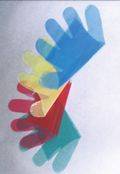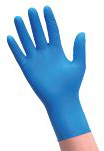Nitrile, vinyl, and latex gloves are a staple in the medical world and have become common in everyday life during the pandemic. They are not biodegradable and will endure for decades or longer in a landfill. Learning how and where to recycle them can help make more single-use gloves into downcycled products like curbside recycling bins or park benches.
Gloves contaminated with medical waste, such as blood or bodily fluids, are a form of hazardous waste that must be sent to the appropriate local hazardous waste facility. Your community may have a specific program for medical waste; if not, a hazardous waste station will do the trick. These gloves will not be recycled and are typically burned to prevent landfill contamination. Examination Gloves Disposable

Before recycling, try reusing your gloves to make them last longer. For many years, it was assumed that sterile gloves cannot be reused without risking contamination. A 2021 study by the University of Waterloo in Ontario, Canada, found that a pair of gloves can be used up to 20 times with proper disinfection. Alcohol, ultraviolet light, or heat treatments can be applied to the gloves between uses to make them safe.
Three kinds of “rubber gloves” are used in healthcare, janitorial, and other jobs that require protection from infection or abrasive and caustic cleaning products. The different types of gloves cannot be mixed when recycled, so be careful to separate them.
Nitrile gloves, which are the most used, accounting for about 41% of gloves sold, are the most recyclable.
Latex gloves made from rubber are outwardly better for the environment than nitrile gloves made from oil, but latex recycling is not widely available. If you choose latex gloves, look for a glove manufacturer that offers recycling services, a “closed loop” solution to your recycling needs. Between eight and 12 percent of the population are allergic to latex, making these gloves a less popular choice.
Vinyl gloves are made with PVC, or #3 plastic, which is not recycled reliably and can ruin other types of plastic when mixed in the recycling process. Vinyl is also a recognized health hazard and has been banned in some countries. They contain phthalates, which can enter the body through the skin and are known to cause cancer. Many healthcare systems avoid using vinyl gloves.
Glove manufacturer Kimberly-Clark also offers more mail-in recycling services, as personal protective equipment (PPE) became a visible and concerning source of waste, litter, and water pollution during the COVID-19 pandemic. The Kimberly-Clark RightCycle Program provides a return process for its products. A hospital or clinic can collect and ship gloves, protective clothing, and eyeglasses – they must contain a full palette of boxed used materials, pay the shipping costs, and, in return, receive an annual report about how much they recycled. Nitrile gloves must be packed in boxes separate from other protective gear.
Medline, another medical glove maker, offers a recycling box for nitrile and latex gloves that is available for purchase by its glove customers.
EPI Canada, a medical products distributor, offers seven sizes of glove collection boxes for purchase, priced from C$19.99 to C$999.99. The boxes come with a postage-paid envelope; customers can send latex, vinyl, and vinyl-nitrate gloves.
Terracycle offers a variety of disposable glove recycling options. Terracycle’s Disposable Gloves Zero Waste Boxes do not require separating different types of gloves – the company will sort them when received and are available for medical organizations, salons, and laboratories. Prices range from $31 to $2,490, depending on size.
Community-organized glove recycling programs, which are volunteer-staffed, are springing up at university and private laboratories. For example, the California NanoSystems Institute at the University of California Santa Barbara has launched a laboratory glove recycling initiative that will share information with other organizations.
Earth911 brings the circular economy to life by connecting the world to brands, products, and services to live sustainably. We help millions of people find local end-of-use options for products and packaging using the largest curated directory of reuse, donation, and recycling locations, municipal curbside collection programs, and mail-in recycling options.
We educate and inform consumers, businesses and communities to inspire thought and facilitate earth-positive consumer decisions. Small changes by thousands of individuals will have a lasting, positive impact. More ideas make less waste.

Pvc Household Gloves © Copyright 2023 Earth Media Partners. All Rights Reserved.